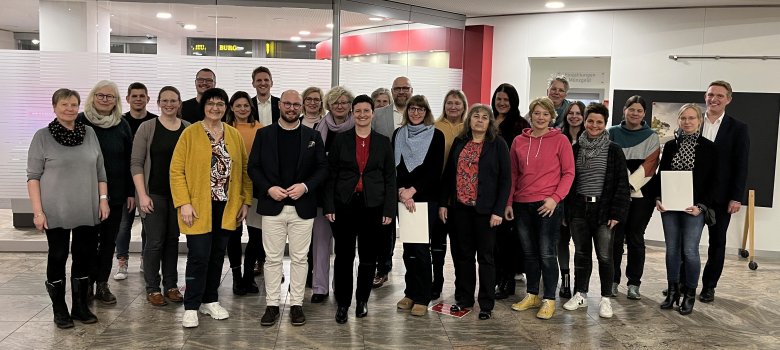Climate Protection Award of the City of Beckum -
Project year 2024
The next round is expected to start in 2026 under similar conditions
In 2024, the town of Beckum once again organised a climate protection award in the period from April to October. There were no limits to creativity when selecting the projects for the climate protection prize: applications were welcome for everything from avoiding packaging waste, joint waste collection campaigns and climate working groups to species protection projects for endangered species with near-natural gardens and insect hotels as well as innovative technical projects. The focus here was on personal initiative in order to become active together locally for environmental protection and thereby encourage other
Beckum residents to join in. The aim of the climate protection award was therefore not least to recognise this civic commitment in conjunction with environmentally-oriented action.
Who could take part?
Private individuals, companies, clubs, associations, educational establishments and social institutions with their place of residence or business in Beckum were eligible to take part. The climate protection project had to have been realised within the last 18 months prior to the application or be so far advanced that initial results were already available. Projects that had already won an award in the past were not allowed to be submitted again within the same framework.
The climate protection prize was endowed with 2,000 euros. The prize money was split between the first three places. This year's winning projects were a sustainable school project, a daycare centre project and a local volunteer animal welfare initiative.
Scope of the project ideas:
- Private individuals:
- Energy-efficient house refurbishment with the use of renewable energies such as solar systems or heat pumps.
- Switching to electromobility by buying an electric car or using e-bikes for the daily commute to work or the shops.
- Creation of a near-natural garden with native plants that contribute to biodiversity and attract insects.
- Organising car-sharing initiatives in the neighbourhood to reduce the number of cars on the roads.
- Company:
- Introduction of measures to reduce packaging waste through the use of sustainable packaging alternatives or the introduction of reusable packaging.
- Implementation of a company mobility concept that offers employees bicycle leasing or job tickets to reduce CO2 emissions caused by commuting.
- Conversion to energy-efficient lighting systems and appliances as well as the use of renewable energies in the company buildings.
- Promoting home office options and virtual meetings to reduce employees' commuting and carbon footprint.
- Clubs and associations:
- Organising waste collection campaigns in the community to free the environment from waste and raise awareness of waste avoidance.
- Organising information events and workshops on topics such as sustainable consumption, recycling and climate protection.
- Establishing community gardens or urban gardening projects to promote local food production and create green spaces.
- Establishment of repair cafés where defective items can be repaired and recycled in order to extend the life of products and reduce waste.
- Educational institutions:
- Integration of environmental and climate protection topics into the curriculum to raise pupils' awareness of sustainable behaviour.
- Implementation of energy-saving projects in school buildings, such as the installation of motion sensors for lighting or the optimisation of heating and cooling systems.
- Organisation of environmental education programmes and excursions to inform pupils about local ecosystems, biodiversity and sustainable lifestyles.
- Creation of school gardens to provide practical experience of horticulture and organic farming and to promote environmental awareness and responsibility.
- Social institutions:
- Introduction of waste avoidance and separation measures in the facilities in order to reduce waste production and promote recycling.
- Organising communal gardening projects or urban gardening activities for residents to promote a sense of community and improve access to fresh food.
- Implementation of energy-saving measures in the buildings, such as the installation of energy-saving lighting systems and the improvement of building insulation.
- Organising workshops and training courses to promote an environmentally conscious lifestyle among users of the facilities.
Climate Council as jury
The jury, which consisted of members of the Climate Council, decided on the most innovative and best projects for climate protection. The assessment criteria for this were relevance for climate protection in Beckum, role model function and feasibility, energy and greenhouse gas savings as well as the special category of innovation.
"One of the aims of climate protection manager Max Hegemann was to give Beckum residents' commitment to climate protection a platform with the climate protection award."
The climate protection prize was supported by Sparkasse Münsterland-Ost and Energieversorgung Beckum.

